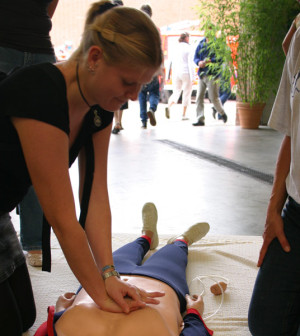- Could Your Grocery Store Meat Be Causing Recurring UTIs?
- Are You Making This Expensive Thermostat Error This Winter?
- Recognizing the Signs of Hypothyroidism
- 10 Strategies to Overcome Insomnia
- Could Artificial Sweeteners Be Aging the Brain Faster?
- Techniques for Soothing Your Nervous System
- Does the Water in Your House Smell Funny? Here’s Why
- Can a Daily Dose of Apple Cider Vinegar Actually Aid Weight Loss?
- 6 Health Beverages That Can Actually Spike Your Blood Sugar
- Treatment Options for Social Anxiety Disorder
Even Moderate Drinking Might Raise Odds for Irregular Heartbeat


People who indulge in even a drink or two a day of wine or liquor may raise their odds for a potentially dangerous form of irregular heartbeat, a new study suggests.
The study did not find a similar trend among moderate beer drinkers — they seemed to have no bump up in risk for the arrhythmia, known as atrial fibrillation.
According to researchers reporting in the July 14 issue of the Journal of the American College of Cardiology, atrial fibrillation is an abnormally fast heartbeat that can result in stroke and heart failure.
It’s possible that the intensity of drinking bouts might play a role in risk for the condition, the Swedish researchers said.
The effect “may be less pronounced if alcohol consumption is spread out over the week compared with consumption of larger amounts of alcohol during a few days per week,” study author Susanna Larsson of the Karolinska Institute in Stockholm, said in a journal news release.
Larsson’s team analyzed data from more than 79,000 Swedish adults, ages 45 to 83, who provided information about their drinking levels and were followed for up to 12 years. During that time, there were more than 7,200 cases of atrial fibrillation among the participants.
As in previous studies, this new paper found that heavy drinking — more than three drinks per day — was associated with increased risk for atrial fibrillation. So was binge drinking, defined as having five or more drinks in a single drinking bout.
The new study also found that moderate drinking — one to three drinks per day — of wine and liquor was associated with a hike in risk for atrial fibrillation. Moderate beer consumption did not boost the risk, however.
Why was beer not a culprit? The researchers offered up one theory.
“It is likely that beer is consumed more regularly during the week, whereas wine and liquor is more often consumed during weekends only,” Larsson said.
Her team also analyzed data from six prior studies that included a total of more than 12,500 cases of atrial fibrillation. That analysis found that each additional drink per day of any type of alcohol boosted the risk of irregular heartbeat by 8 percent.
Both trials could only point to an association between drinking levels and risk for atrial fibrillation; they could not prove cause-and-effect.
However, the new findings may make it tough for consumers to know how much drinking is good or bad for them, one heart expert said.
Dr. Evelina Grayver is director of the Coronary Care Unit at North Shore University Hospital in Manhasset, N.Y. She noted that some high-profile studies released in the past have suggested that a drink or two per day might actually boost heart health.
“This study now prompts us to balance the already known fact about reduced risk of heart disease and stroke associated with low-moderate alcohol consumption, with the potential increased risk for atrial fibrillation,” she said.
Grayver believes that in the end there’s no “one size fits all” guideline for drinking and cardiovascular health. She advises people to “be aware of their own risk factors for atrial fibrillation — hypertension, diabetes, age, history of heart failure and stroke — and realize that alcohol use may have more harm than benefit in certain individual patients.”
More information
The U.S. National Library of Medicine has more about atrial fibrillation.
Source: HealthDay
Copyright © 2026 HealthDay. All rights reserved.










